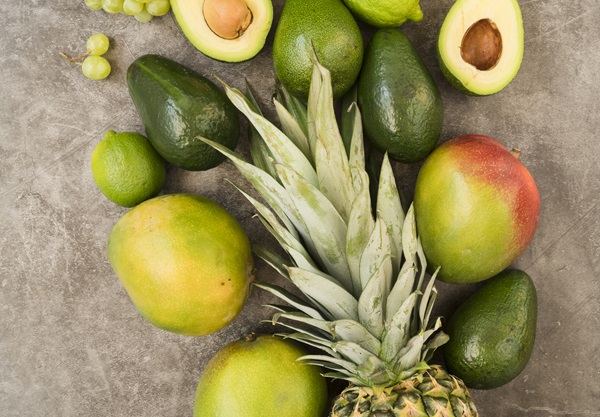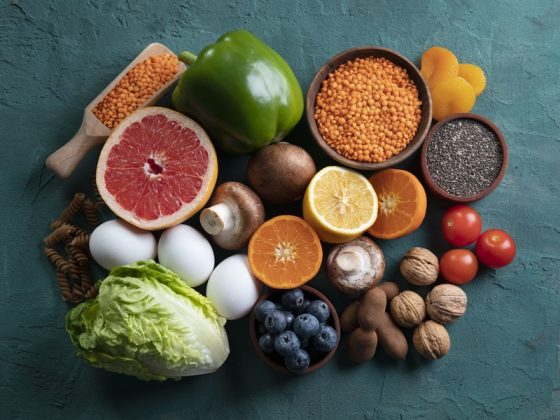Vitamin C, also known as ascorbic acid, is a vital nutrient that plays a crucial role in maintaining overall health and enhancing the immune system. This water-soluble vitamin is renowned for its antioxidant properties, which help combat oxidative stress and support cellular function. Incorporating Vitamin C into your diet is easy and delicious, thanks to a variety of fruits rich in vitamin C that are naturally rich in this essential nutrient.
From tangy citrus fruits to juicy berries and tropical delights, these fruits not only offer a burst of flavor but also provide a significant boost to your daily Vitamin C intake. This article explores the many benefits of Vitamin C for your body and immune system and highlights some of the best fruits rich in vitamin C to include in your diet to ensure you’re getting enough of this powerful vitamin.

I. Introduction
A. Importance of Vitamin C for Immune Health
Vitamin C is a crucial nutrient for maintaining a healthy immune system. It plays a significant role in the body’s defense mechanisms, helping to ward off illnesses and infections. As an essential vitamin, it cannot be produced by the body and must be obtained through a diet like fruits rich in vitamin C.
B. Overview of the Role of Vitamin C in the Body
Vitamin C, also known as ascorbic acid, is involved in various physiological functions. It acts as a powerful antioxidant, protecting cells from damage caused by free radicals. Additionally, it supports the production of collagen, a protein vital for skin health and wound healing. Its role in the immune system includes enhancing the function of immune cells and improving the body’s ability to fight off pathogens.
C. Objectives of the Article: Highlighting Top Fruits Rich in Vitamin C
This article aims to highlight the top fruits rich in vitamin C that can enhance immune health. By incorporating these fruits into your diet, you can boost your vitamin C intake and support overall well-being.
II. The Role of Vitamin C in Immune Health
A. Functions of Vitamin C in the Immune System
Vitamin C is essential for the proper functioning of immune cells, including lymphocytes and phagocytes. It enhances the production and function of white blood cells, which are critical for fighting infections. Vitamin C also helps to regenerate other antioxidants in the body, such as vitamin E, further supporting the immune system.
B. Benefits of Adequate Vitamin C Intake
Adequate vitamin C intake has been linked to numerous health benefits, including a reduced risk of chronic diseases such as cardiovascular disease and cancer. It can also shorten the duration and severity of common colds and improve skin health. Regular consumption of foods such as fruits rich in vitamin C supports overall immune function and helps maintain the body’s defenses against infections.
C. Recommended Daily Intake of Vitamin C
The recommended daily intake of vitamin C varies by age, sex, and life stage. For most adults, the daily recommended intake is about 90 mg for men and 75 mg for women. Pregnant and breastfeeding women have higher requirements. It’s important to meet these needs through a balanced diet of fruits rich in vitamin C.

III. Top 10 Fruits Rich in Vitamin C
1. Oranges
a. Vitamin C Content
Oranges are renowned for their high vitamin C content. A medium-sized orange provides approximately 70 mg of vitamin C, which is about 78% of the daily recommended intake for adults.
b. Health Benefits and Ways to Incorporate Oranges
Oranges support immune function, improve skin health, and may reduce the risk of chronic diseases. They are versatile and can be enjoyed fresh, as a juice, or added to salads and desserts. Oranges are also a great addition to smoothies and can be used as a natural sweetener in various recipes.
2. Kiwifruit
a. Vitamin C Content
Fruits rich in Vitamin C include kiwifruit, which is another excellent source of this essential nutrient, with one medium-sized kiwi providing about 71 mg of vitamin C, which covers nearly 79% of the daily requirement.
b. Health Benefits and Ways to Incorporate Kiwifruit
Kiwifruit aids in digestion supports heart health, and enhances immune function. It can be eaten fresh, added to fruit salads, or blended into smoothies. Kiwi can also be used as a topping for yogurt or oatmeal.
3. Strawberry
a. Vitamin C Content
Strawberry is one of the fruits rich in vitamin C, with one cup of sliced strawberries providing approximately 89 mg of vitamin C, exceeding the daily recommended intake for adults.
b. Health Benefits and Ways to Incorporate Strawberries
Strawberries promote heart health, improve skin health, and have anti-inflammatory properties. They can be enjoyed fresh, added to salads, or used in smoothies and desserts. Strawberries also make a great addition to breakfast dishes like yogurt parfaits.
4. Pineapples
a. Vitamin C Content
Fruits rich in Vitamin C include pineapples, which are a great source of this essential nutrient, with one cup of fresh pineapple chunks providing about 79 mg of vitamin C, nearly 88% of the daily requirement.
b. Health Benefits and Ways to Incorporate Pineapples
Pineapples support digestive health, boost immune function, and have anti-inflammatory properties. They can be eaten fresh, added to fruit salads, or used in savory dishes like grilled pineapple chicken. Pineapple juice or smoothies are also popular ways to enjoy this tropical fruit.
5. Mangoes
a. Vitamin C Content
Mangoes are high in vitamin C, with one cup of diced mango providing about 60 mg of vitamin C, covering roughly 67% of the daily recommended intake.
b. Health Benefits and Ways to Incorporate Mangoes
Mangoes support immune health, improve digestion, and provide antioxidants. They can be enjoyed fresh, added to salads, or blended into smoothies. Mangoes are also delicious in salsas and desserts.
6. Papayas
a. Vitamin C Content
Papayas are exceptionally abundant in vitamin C, making them one of the fruits rich in vitamin C which is a vital nutrient. with one cup of cubed papaya providing about 88 mg of vitamin C, which is nearly 98% of the daily recommended intake.
b. Health Benefits and Ways to Incorporate Papayas
Papayas aid in digestion, support immune function and have anti-inflammatory effects. They can be eaten fresh, added to fruit salads, or blended into smoothies. Papaya can also be used in savory dishes and salsas.
7. Guavas
a. Vitamin C Content
Guavas are one of the richest sources of vitamin C, with one cup of guava providing about 377 mg of vitamin C, far exceeding the daily recommended intake.
b. Health Benefits and Ways to Incorporate Guavas
Guavas boost immune health, support digestion, and have antioxidant properties. They can be eaten fresh, added to smoothies, or used in jams and sauces. Guava juice is also a tasty and nutritious option.
8. Grapefruits
a. Vitamin C Content
Grapefruits are a good source of vitamin C, with one-half of a medium grapefruit providing about 38 mg of vitamin C, covering approximately 42% of the daily requirement.
b. Health Benefits and Ways to Incorporate Grapefruits
Grapefruits support immune function, improve heart health, and may aid in weight management. They can be eaten fresh, added to salads, or enjoyed as a juice. Grapefruit segments are also a great addition to breakfast dishes.
9. Acerola Cherries
a. Vitamin C Content
Acerola cherries are exceptionally high in vitamin C, with just one cherry providing about 82 mg of vitamin C, significantly more than the daily requirement.
b. Health Benefits and Ways to Incorporate Acerola Cherries
Acerola cherries support immune health, provide antioxidants, and may improve skin health. They can be eaten fresh or used in supplements, juices, and smoothies. Acerola cherry powder is also available as a dietary supplement.
10. Raspberries
a. Vitamin C Content
Raspberries are a good source of vitamin C, with one cup of raspberries providing about 32 mg of vitamin C, which is approximately 36% of the daily recommended intake.
b. Health Benefits and Ways to Incorporate Raspberries
Raspberries support immune health, provide antioxidants, and have anti-inflammatory properties. They can be enjoyed fresh, added to yogurt, smoothies, or baked goods. Raspberries also make a great topping for oatmeal or salads.

IV. Practical Tips for Incorporating Fruits Rich in Vitamin C
A. Creative Ways to Include Fruits in Your Diet
Incorporate fruits rich in vitamin C into your daily diet by using them in various ways. Add them to salads, smoothies, and desserts, or enjoy them as a fresh snack. Mixing fruits with yogurt or oatmeal can also enhance your vitamin C intake.
B. Recipe Ideas and Snack Suggestions
Try making a tropical fruit salad with mangoes, papayas, and pineapples, or blend strawberries and kiwis into a refreshing smoothie. For a quick snack, enjoy apple slices with guava paste or create a citrus fruit platter with oranges and grapefruits.
C. Tips for Maximizing Fruits Rich in Vitamin C
To retain the maximum amount of vitamin C in fruits, store them properly and avoid prolonged exposure to heat and light. Consume fruits raw or lightly cooked to preserve their nutrient content. Freeze fruits to extend their shelf life while maintaining their vitamin C levels.
V. Additional Tips for Supporting Immune Health
A. Balanced Diet and Nutritional Variety
A balanced diet and nutritional variety are essential for optimal health, as they provide a wide range of essential nutrients your body needs. While fruits rich in vitamin C are beneficial, they are not the only source; incorporating vegetables, whole grains, lean proteins, and healthy fats ensures you get a comprehensive array of vitamins and minerals. Aim to include a wide range of nutrient-dense foods to support a strong immune system.
B. Importance of Hydration and Lifestyle Factors
Staying hydrated is crucial for maintaining optimal health and immune function. Drink plenty of water throughout the day and limit the consumption of sugary and caffeinated beverages. Adopting a healthy lifestyle that includes regular exercise, stress management, and adequate sleep also supports immune health.
C. Other Essential Nutrients for Immune Support
In addition to vitamin C, other nutrients such as vitamin D, zinc, and omega-3 fatty acids play a vital role in supporting the immune system. Ensure your diet includes these essential nutrients to enhance overall immune function.
VI. Conclusion
A. Recap of the Benefits of Fruits Rich in Vitamin C
Fruits rich in Vitamin C offer numerous health benefits, including enhanced immune function, improved skin health, and reduced risk of chronic diseases. Incorporating these fruits into your diet.

